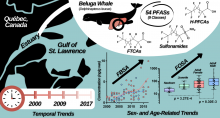| Title | Querying the In Vitro Proteome Cysteine Reactivity of 8:2 Fluorotelomer Acrylate. |
| Publication Type | Journal Article |
| Year of Publication | 2023 |
| Authors | Hall, DRoss, Gauthier, J, Peng, H |
| Journal | Environ Sci Technol |
| Date Published | 2023 Aug 22 |
| ISSN | 1520-5851 |
| Abstract | Despite the phase out of legacy per- and polyfluoroalkyl substances (PFAS), fluorotelomer-based polymers (FTP) have been used for many applications, notably textile surface coatings. FTPs are of a health concern due to their breakdown into legacy PFAS and the co-occurrence of fluorotelomer acrylate (FTAC) monomers, of which the latter may potentially react with cellular thiols. To evaluate this hypothesis, we employed fluorous-solid-phase extraction (FSPE), to enrich peptides covalently modified by 8:2 fluorotelomer acrylate (8:2 FTAC) and coupled it to a modified nano-liquid chromatography method for the identification of in vitro protein adducts using bottom-up data-dependent proteomics analysis. Using this method, over 100 unique peptides were detected with 8:2 FTAC modifications, although none of the modified cysteine residues were annotated active site nucleophiles. In parallel, a synthetic CF-iodoacetamide (F-IAM) chemical probe was used to gauge the upper bound of PFAS-thiol reactivity. Over seven hundred peptides were detected with modifications but only 9 of 28 annotated active site cysteines in this dataset were modified by F-IAM. Further exploration of the impacts of 8:2 FTAC adducts on protein function revealed that 8:2 FTAC modification promotes protein aggregation in vitro. These results suggest that 8:2 FTAC may exhibit significant proteome thiol reactivity and imply a more general mechanism of toxicity of PFAS-induced protein aggregation. |
| DOI | 10.1021/acs.est.3c02930 |
| Alternate Journal | Environ Sci Technol |
| PubMed ID | 37607404 |
Environmental Chemical Biology

